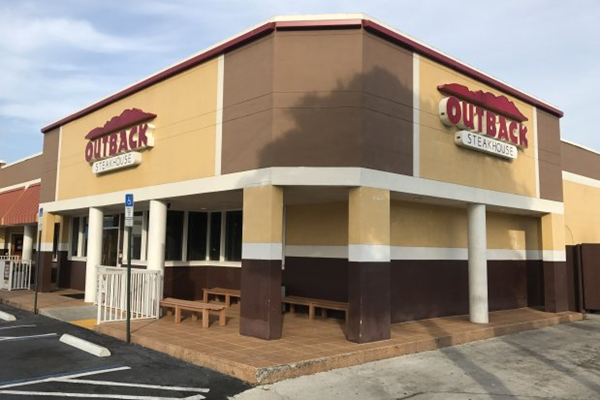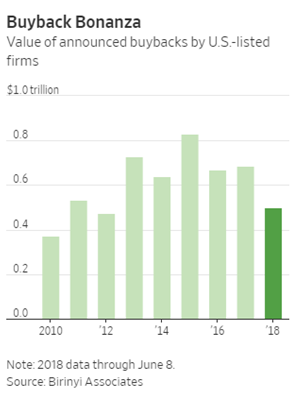THE
WALL STREET JOURNAL.
Markets
Insiders Pocket Gains on Buybacks, Vexing Regulator
SEC Commissioner
Jackson says executives are taking advantage of loopholes; calls
for review to change regulatory rules
|

The recent surge in buybacks
follows changes to the tax law that made them more attractive
for companies and executives have been selling significantly
more of their stock immediately after the news. Bloomin’ Brands
Inc., the operator of casual-dining spots including Outback
Steakhouse, illustrates the trend. PHOTO: SCOTT KEELER/ZUMA
PRESS |
By
Gretchen Morgenson and
Tom McGinty
June 10, 2018 12:00 p.m. ET
Corporate insiders
are personally capitalizing on the recent boom in buyback
announcements, vexing a top regulatory official.
Taking advantage of price bumps that often accompany
share-repurchase announcements, company executives have been selling
significantly more of their stock immediately after the news than they do
beforehand, according to an analysis by Robert J. Jackson, Jr., a commissioner
at the Securities and Exchange Commission.
In a speech on Monday, Mr. Jackson—appointed by President Donald
Trump and sworn in this year to fill a Democratic seat at the SEC—will urge
regulators to review securities laws that provide protection to insiders making
such trades.
Insiders who sell stock into buyout bounces aren’t trading
illegally, of course, and Mr. Jackson isn’t accusing them of that. And other
investors also have the opportunity to take advantage of the bumps. But these
price surges can be especially beneficial to corporate executives holding large
chunks of corporate stock looking for an uptick to unload shares.
“The SEC gives an exemption from market-manipulation rules to
companies doing a buyback,” Mr. Jackson said in an interview. “The SEC shouldn’t
be making it easier for executives to use them to cash out.”
Mr. Jackson, a former law professor, examined stock trades at 385
companies that announced buybacks in 2017 through this year’s first quarter. He
found the percentage of insiders selling shares more than doubled immediately
following their companies’ buyback announcements as many of the stocks popped.
Daily stock sales by the insiders rose from an average of
$100,000 before the buyback announcements to $500,000 after them. The sellers
received proceeds totaling $75 million more than had they sold before the
announcement, the study concluded. At 32% of the companies, at least one insider
sold in the first 10 days after the buyback announcement.
As is customary among SEC commissioners, Mr. Jackson is careful
to note that his views are his own and don’t reflect those of the entire agency.
The SEC didn’t return an email seeking comment.
What’s clear is that such corporate share-repurchase programs
have grown increasingly popular among companies. So far this year, buyback
announcements from all U.S. publicly traded companies totaled just over $500
billion, according to data from Birinyi Associates Inc. For all of last year,
companies announced $685 billion in buybacks up from $670 billion in 2016.
The recent activity follows changes to the tax law that made
buybacks more attractive for companies. Many investors welcome the deals because
they often boost a stock’s price, but some consider them a dubious use of
corporate capital if they are made at high valuations or if the returns from
buybacks don’t exceed an investment in the business.
Stock repurchases can make a company’s earnings per share appear
better by reducing its number of shares outstanding. Buybacks can also bolster
executive pay at companies using benchmarks based on earnings-per-share
increases.
Mr. Jackson’s study didn’t identify specific companies. But
Bloomin’ Brands Inc., the operator
of casual-dining spots including Outback Steakhouse, illustrates the trend.
Before the market opened Feb. 22, the company announced its earnings and noted
the existence of a new $150 million stock-repurchase program.
On that day and on Feb. 26, Chief Technology Officer Donagh
Herlihy sold a combined 216,562 shares, generating roughly $1.4 million in net
proceeds, regulatory filings show.
On March 2, six days after the news, Chief Legal Officer Joseph
Kadow sold roughly 281,000 shares generating $5.07 million, according to the
filings. Also that day, Chairman and Chief Executive Officer Elizabeth Smith
sold 150,000 shares generating $2.5 million, filings indicate.
The sales were executed at prices that were, on average, 7%
higher than the closing price the day before the buyback was announced. The
three executives declined to comment on the sales but a Bloomin’ Brands
spokeswoman said in a statement: “We have had share buyback programs in place
continually since December 2014 and in similar or larger amounts.”
In the interview, Mr. Jackson said the SEC hasn’t looked at
buyback rules for more than a decade. With the recent surge in such activity, he
said, “it’s time to take another look at these rules.”
At issue is Rule 10b-18 of the Securities Exchange Act of
1934, which advises companies how to proceed with buyback timing and other
mechanics, such as prices paid and volume restrictions. It also provides a “safe
harbor” for officers or directors to trade in the shares during a repurchase
without running afoul of antifraud provisions of the securities laws.
Mr. Jackson believes that executives who sell into buybacks are
benefiting at the expense of shareholders. “If an executive believes a buyback
is the right thing for the long term, they should put their money where their
mouth is and keep their stockholdings,” he said.
The study also found that in the days leading up to share
repurchase announcements, the companies’ stocks underperformed the broader
market by an average of 1.4%. During the 30 days after the announcement, the
companies’ stocks outperformed the overall market by an average of 2.5%.
Mr. Jackson is scheduled to present his analysis Monday at the
Center for American Progress, a left-leaning think tank in Washington. The study
parallels his past academic work on corporate governance issues. He taught law
at NYU and Columbia and was founding director of the Columbia Law School’s Data
Lab, which used technology to study the reliability of company disclosures.
Write to
Gretchen
Morgenson at gretchen.morgenson@wsj.com and
Tom McGinty at tom.mcginty@wsj.com
Appeared in the June 11, 2018, print edition as 'Insiders Make Hay
On Rising Buybacks.'

